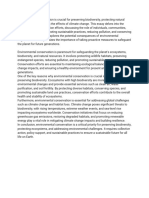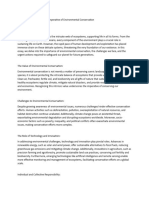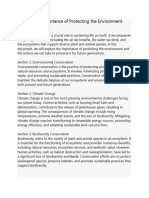Professional Documents
Culture Documents
Comprehension
Comprehension
Uploaded by
Muhayr Manzoor0 ratings0% found this document useful (0 votes)
8 views4 pagesThe passage discusses the importance of environmental conservation. It states that as human activities impact the planet, protecting the environment is essential. Environmental conservation involves safeguarding biodiversity, ecosystems, reducing pollution, and sustainable resource management. It also provides social and economic benefits like clean air/water and jobs. While governments, businesses, communities, and individuals all have a role to play in conservation efforts, collective action is needed to create a sustainable future.
Original Description:
Copyright
© © All Rights Reserved
Available Formats
DOCX, PDF, TXT or read online from Scribd
Share this document
Did you find this document useful?
Is this content inappropriate?
Report this DocumentThe passage discusses the importance of environmental conservation. It states that as human activities impact the planet, protecting the environment is essential. Environmental conservation involves safeguarding biodiversity, ecosystems, reducing pollution, and sustainable resource management. It also provides social and economic benefits like clean air/water and jobs. While governments, businesses, communities, and individuals all have a role to play in conservation efforts, collective action is needed to create a sustainable future.
Copyright:
© All Rights Reserved
Available Formats
Download as DOCX, PDF, TXT or read online from Scribd
Download as docx, pdf, or txt
0 ratings0% found this document useful (0 votes)
8 views4 pagesComprehension
Comprehension
Uploaded by
Muhayr ManzoorThe passage discusses the importance of environmental conservation. It states that as human activities impact the planet, protecting the environment is essential. Environmental conservation involves safeguarding biodiversity, ecosystems, reducing pollution, and sustainable resource management. It also provides social and economic benefits like clean air/water and jobs. While governments, businesses, communities, and individuals all have a role to play in conservation efforts, collective action is needed to create a sustainable future.
Copyright:
© All Rights Reserved
Available Formats
Download as DOCX, PDF, TXT or read online from Scribd
Download as docx, pdf, or txt
You are on page 1of 4
Comprehension Passage:
Title: The Importance of Environmental Conservation
In today's rapidly evolving world, environmental conservation
has become an increasingly pressing issue. As human activities
continue to have a profound impact on the planet,
understanding the importance of protecting and preserving
the environment is essential. By conserving our natural
resources and promoting sustainable practices, we can create
a healthier and more sustainable future for generations to
come.
Environmental conservation encompasses a range of practices
aimed at safeguarding the natural world. It involves protecting
biodiversity, preserving ecosystems, reducing pollution, and
promoting sustainable resource management. One of the
primary reasons why environmental conservation is crucial is
the preservation of biodiversity. Ecosystems thrive on the
diversity of plant and animal species, and any disruption to
this delicate balance can have severe consequences.
Conservation efforts help maintain habitats and protect
endangered species, ensuring the continued existence of our
planet's rich biodiversity.
Another vital aspect of environmental conservation is the
sustainable use of resources. Our planet's resources, such as
water, forests, and minerals, are finite and must be managed
responsibly. By adopting sustainable practices, we can
minimize resource depletion, reduce waste, and promote
efficient use. For example, sustainable forestry practices
involve replanting trees and using timber in a responsible
manner to prevent deforestation and ensure the long-term
availability of wood resources.
Conservation also plays a significant role in mitigating
environmental pollution. Pollution, whether it be air, water, or
soil pollution, poses serious threats to human health and the
well-being of ecosystems. By implementing measures to
reduce pollution and promote clean technologies, we can
improve air and water quality, protect wildlife, and safeguard
human health. Efforts to reduce greenhouse gas emissions and
combat climate change are also crucial components of
environmental conservation, as they aim to mitigate the
adverse effects of global warming and preserve the planet's
delicate climate balance.
Moreover, environmental conservation has far-reaching social
and economic benefits. A healthy environment provides
essential ecosystem services, such as clean air, water
purification, and soil fertility. These services contribute to
human well-being, supporting agriculture, providing clean
drinking water, and offering recreational opportunities.
Additionally, conservation efforts can create employment
opportunities in fields like eco-tourism, renewable energy, and
sustainable agriculture, contributing to local economies while
promoting environmental sustainability.
However, achieving effective environmental conservation
requires collective effort. Governments, businesses,
communities, and individuals all have a role to play.
Governments must enact and enforce environmental
regulations, promote sustainable development policies, and
invest in renewable energy and conservation projects.
Businesses can adopt sustainable practices, reduce their
carbon footprint, and integrate environmental considerations
into their operations. Communities can raise awareness,
participate in conservation initiatives, and make conscious
choices in their daily lives. Each individual can contribute by
practicing responsible consumption, reducing waste,
conserving energy, and supporting organizations dedicated to
environmental conservation.
In conclusion, environmental conservation is of utmost
importance in today's world. By preserving biodiversity,
promoting sustainable resource management, reducing
pollution, and recognizing the social and economic benefits of
a healthy environment, we can create a sustainable future for
ourselves and future generations. It is crucial for individuals,
communities, and governments to work together and take
proactive steps to protect and preserve our natural world.
Only through collective action and a shared commitment to
environmental stewardship can we ensure the well-being of
both our planet and ourselves.
You might also like
- Sedimentary Rocks Pettijohn 2edDocument776 pagesSedimentary Rocks Pettijohn 2edGiovanna HdzNo ratings yet
- Environment Conservation - ArticleDocument2 pagesEnvironment Conservation - ArticleSumit GunjanNo ratings yet
- The Importance of Environmental ConservationDocument2 pagesThe Importance of Environmental Conservationpiti.ricardo1993No ratings yet
- 4Document1 page4Alex MorozovNo ratings yet
- ADocument1 pageAAlex MorozovNo ratings yet
- The Importance of Environmental ConservationDocument2 pagesThe Importance of Environmental ConservationjuniNo ratings yet
- PINTANG - ST - Conserve or ConverseDocument2 pagesPINTANG - ST - Conserve or Conversecharmeljane1110No ratings yet
- ENVIRONMENTDocument3 pagesENVIRONMENTcloudberryariyannaNo ratings yet
- The Importance of Environmental ConservationDocument1 pageThe Importance of Environmental Conservationmandykins26No ratings yet
- Essay 2Document1 pageEssay 2limchu.jommelNo ratings yet
- EnvironmentDocument3 pagesEnvironmentOlga SavchenkoNo ratings yet
- 12 - копияDocument1 page12 - копияkatkatkat2002No ratings yet
- EnvironmentDocument3 pagesEnvironmentJohn Eric David100% (1)
- TCS EssayDocument4 pagesTCS Essayswin0897.eduNo ratings yet
- 5-The Importance of Environmental ConservationDocument2 pages5-The Importance of Environmental ConservationJuanSB827No ratings yet
- Num 4Document1 pageNum 4Mandy LeeNo ratings yet
- Protecting The Environment Full PaperDocument2 pagesProtecting The Environment Full PaperNguyễn AnhNo ratings yet
- Essay 2Document1 pageEssay 2RonaldvdMScribdNo ratings yet
- English PTDocument1 pageEnglish PTRhian Joy Balantac DaguioNo ratings yet
- 2 The Power of Storytelling in Shaping H 2 2Document1 page2 The Power of Storytelling in Shaping H 2 2anfugmxpNo ratings yet
- Essay On The Importance of Environmental SustainabilityDocument1 pageEssay On The Importance of Environmental SustainabilityZABLON MUTHOKANo ratings yet
- Topic 1Document22 pagesTopic 1Hacelen VergoniaNo ratings yet
- The Importance of Environmental Conservation - Preserving Our Planet For Future GenerationsDocument2 pagesThe Importance of Environmental Conservation - Preserving Our Planet For Future Generationshogobay680No ratings yet
- Environment: Our Planet, Our Responsibility: Climate Change: A Global CrisisDocument2 pagesEnvironment: Our Planet, Our Responsibility: Climate Change: A Global Crisislefip60594No ratings yet
- EnvironmentDocument2 pagesEnvironmentdestiny032302No ratings yet
- Bài Luận Về Chủ Đề "REGENERATION" ASEP Seedling "Document6 pagesBài Luận Về Chủ Đề "REGENERATION" ASEP Seedling "Vương Tiến ĐạtNo ratings yet
- Environmental Science 1 SadasDocument38 pagesEnvironmental Science 1 SadasBrylle Angelo T. JadolNo ratings yet
- Group 2Document1 pageGroup 2Monsta XNo ratings yet
- Environmental ConservationDocument3 pagesEnvironmental Conservationarefehsw7No ratings yet
- The Importance of Sustainable LivingDocument1 pageThe Importance of Sustainable LivingHASHIM AMJADNo ratings yet
- Environmental Conservation Is Crucial For The Sustainability of Our PlanetDocument1 pageEnvironmental Conservation Is Crucial For The Sustainability of Our PlanetMkwNo ratings yet
- The Importance of Environmental ConservationDocument2 pagesThe Importance of Environmental ConservationTEZvNo ratings yet
- E1Document2 pagesE1MJNo ratings yet
- Nurturing EnvironmentDocument2 pagesNurturing Environmentlozaha70No ratings yet
- The Importance of Environmental ConservationDocument1 pageThe Importance of Environmental ConservationlihasadsNo ratings yet
- Planet PreservationDocument2 pagesPlanet PreservationARCHIT MAHAJAN 18bce013No ratings yet
- Tài liệu ngày 10032024 EnvironmentDocument5 pagesTài liệu ngày 10032024 Environmentdungnhm25062005No ratings yet
- Group 5 Sustainable Land Management To Minimize Rampant DeforestationDocument6 pagesGroup 5 Sustainable Land Management To Minimize Rampant DeforestationRobert Bruce HammertonNo ratings yet
- Ecological SustainabilityDocument2 pagesEcological Sustainabilitybiel-joga101No ratings yet
- Environmental - Impact Analysis ass-WPS - OfficeDocument4 pagesEnvironmental - Impact Analysis ass-WPS - OfficeHalidu BarauNo ratings yet
- The Importance of Environmental ConservationDocument1 pageThe Importance of Environmental ConservationAqsa khanNo ratings yet
- Nurturing NatureDocument2 pagesNurturing Naturekhoatranminha8No ratings yet
- The Urgency of Environmental Conservation - Preserving Our Planet For Future GenerationsDocument2 pagesThe Urgency of Environmental Conservation - Preserving Our Planet For Future GenerationsErina NakiriNo ratings yet
- Essay 2Document1 pageEssay 2movieexclusive02No ratings yet
- Enviroment HiraneshDocument9 pagesEnviroment HiraneshRAJKUMAR A/L PALMANAPHAN MoeNo ratings yet
- Digital Tech 3Document2 pagesDigital Tech 3Ritik ShahNo ratings yet
- The Importance of Environmental ConservationDocument3 pagesThe Importance of Environmental Conservationjashanvipan1290No ratings yet
- The Importance of Environmental ConservationDocument1 pageThe Importance of Environmental ConservationDocilzeuzNo ratings yet
- Title: Doing Better For Mother Earth: A Call To Environmental ActionDocument3 pagesTitle: Doing Better For Mother Earth: A Call To Environmental ActionSudhanwa KulkarniNo ratings yet
- PeDocument2 pagesPekanishkmodi31No ratings yet
- Title: The Importance of Protecting The EnvironmentDocument2 pagesTitle: The Importance of Protecting The Environmentvinaytdm123No ratings yet
- The Importance of Environmental ConservationDocument4 pagesThe Importance of Environmental Conservationjashanvipan1290No ratings yet
- The Importance of Biodiversity Conservation in Sustainable DevelopmentDocument1 pageThe Importance of Biodiversity Conservation in Sustainable Developmentfritzjhone8No ratings yet
- Why Preserve Biodiversity? Illustrate The Importance of BiodiversityDocument2 pagesWhy Preserve Biodiversity? Illustrate The Importance of BiodiversitySarah GNo ratings yet
- ENG101 SpeechDocument1 pageENG101 SpeechUgly BastardNo ratings yet
- Introduction To Environment ManagementDocument10 pagesIntroduction To Environment ManagementItisshatakshiNo ratings yet
- HealthDocument1 pageHealthqwdfv943No ratings yet
- Evs4thsem VIDocument38 pagesEvs4thsem VIprathamsh1999No ratings yet
- Conservation EssayDocument1 pageConservation EssayAlfredo CeraNo ratings yet
- The Importance of Environmental ConservationDocument1 pageThe Importance of Environmental ConservationjiteshNo ratings yet
- Sherlock HolmesDocument2 pagesSherlock HolmesMuhayr ManzoorNo ratings yet
- Cambridge International List of Fees - Checkpoint - MJ24Document3 pagesCambridge International List of Fees - Checkpoint - MJ24Muhayr ManzoorNo ratings yet
- Bangla CT - 3Document2 pagesBangla CT - 3Muhayr ManzoorNo ratings yet
- Maths Final Term Exam 2020-2021Document5 pagesMaths Final Term Exam 2020-2021Muhayr ManzoorNo ratings yet
- Geo Week Poster Printing DocumentDocument1 pageGeo Week Poster Printing DocumentMuhayr ManzoorNo ratings yet
- Personification Worksheet 6Document2 pagesPersonification Worksheet 6Muhayr ManzoorNo ratings yet
- Detailed Complete List of NNRMS ProjectsDocument17 pagesDetailed Complete List of NNRMS ProjectsSubs KatsNo ratings yet
- KENNETH C. GUTIERREZ (Narrative Report in Hydrology)Document4 pagesKENNETH C. GUTIERREZ (Narrative Report in Hydrology)Kent Arrol GutierrezNo ratings yet
- The Man Animal ConflictDocument1 pageThe Man Animal ConflictArjun NaikareNo ratings yet
- En - 8491 Water Supply Engineering: Unit - 1 Sources of WaterDocument4 pagesEn - 8491 Water Supply Engineering: Unit - 1 Sources of WatersanthiamuthaNo ratings yet
- Alluvial Diamonds Project Requires Investors in DR CongoDocument25 pagesAlluvial Diamonds Project Requires Investors in DR CongoLovemir Mauled100% (1)
- Extensive Global Wetland Loss Over The Past Three Centuries - NatureDocument8 pagesExtensive Global Wetland Loss Over The Past Three Centuries - NaturemmprogrammerNo ratings yet
- SOAL-EBS-2 BASING-X-2012-sentosaDocument4 pagesSOAL-EBS-2 BASING-X-2012-sentosaAnthon KurniadiNo ratings yet
- Types of EcosystemDocument2 pagesTypes of EcosystemnaweedNo ratings yet
- Course Outline in Philippine Geography (2011)Document3 pagesCourse Outline in Philippine Geography (2011)jetzon202286% (7)
- Inbound 5044868270576238027Document21 pagesInbound 5044868270576238027Jacquelyn Andres SanchezNo ratings yet
- Raft Tectonics in The Kwanza Basin, AngolaDocument16 pagesRaft Tectonics in The Kwanza Basin, AngolaPedro Henrique Vogt SilveiraNo ratings yet
- Gold Iron Nickel Chromite Copper: Table 1Document2 pagesGold Iron Nickel Chromite Copper: Table 1Joshua Dave NadalNo ratings yet
- DCA Technical Guidelines Horizontal Directional DrillingDocument35 pagesDCA Technical Guidelines Horizontal Directional DrillingCristiano BandeiraNo ratings yet
- Clerc 2020Document23 pagesClerc 2020pablo.olivares.mNo ratings yet
- B.Sc. Geology Final Equivalence - 18022022Document3 pagesB.Sc. Geology Final Equivalence - 18022022RohittitansinghNo ratings yet
- t2 G 2567167 All About Global Warming Powerpoint LT Powerpoint GT Ver 1Document13 pagest2 G 2567167 All About Global Warming Powerpoint LT Powerpoint GT Ver 1Balaguru DevanNo ratings yet
- Saes A 112Document25 pagesSaes A 112mohamed hashimNo ratings yet
- UNIT 3: Assessment of Water Quantity: Surface Monitoring, GroundwaterDocument22 pagesUNIT 3: Assessment of Water Quantity: Surface Monitoring, GroundwaterGleanna NiedoNo ratings yet
- Grade 6 Science Most Essential Learning Competencies MELCsDocument5 pagesGrade 6 Science Most Essential Learning Competencies MELCsCherrylin Sarmiento100% (1)
- Earth: Earth Is The Third Planet From The Sun, It Is The Densest and Fifth-Largest of The EightDocument1 pageEarth: Earth Is The Third Planet From The Sun, It Is The Densest and Fifth-Largest of The EightFery DoankNo ratings yet
- Excellent Map Skills BookletDocument6 pagesExcellent Map Skills BookletKenny WongNo ratings yet
- Environment Vocabulary BankDocument2 pagesEnvironment Vocabulary BankIoana MariaNo ratings yet
- Charles - 2002 - Internal Erosion in European Embankment Dams PDFDocument16 pagesCharles - 2002 - Internal Erosion in European Embankment Dams PDFrabhishekpatNo ratings yet
- Daylight Saving in Temperate RegionsDocument81 pagesDaylight Saving in Temperate RegionsRaaja ShekharNo ratings yet
- Tugas RajaaDocument2 pagesTugas RajaaaaaNo ratings yet
- EarthandLifeSci12 Q1 Mod3 Rock Metamorphism and Different Types of Stress Version2Document40 pagesEarthandLifeSci12 Q1 Mod3 Rock Metamorphism and Different Types of Stress Version2Arthur LaurelNo ratings yet
- Point Comparison ReportDocument5 pagesPoint Comparison Reportpopovicib_2No ratings yet
- Earth As A SystemDocument15 pagesEarth As A SystemDondon TayabanNo ratings yet
- Mining EssayDocument1 pageMining Essayapi-708123795No ratings yet































































































